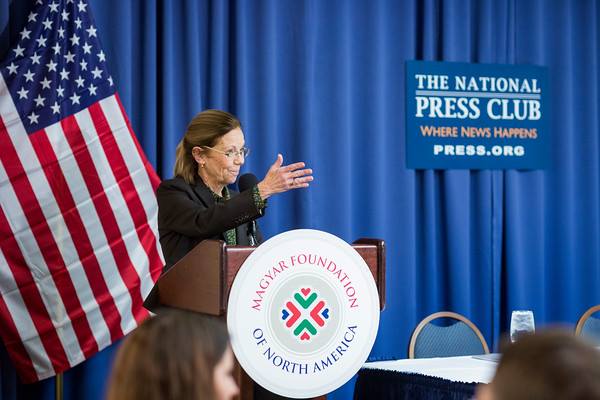The https://english.atlatszo.hu use cookies to track and profile customers such as action tags and pixel tracking on our website to assist our marketing. On our website we use technical, analytical, marketing and preference cookies. These are necessary for our site to work properly and to give us inforamation about how our site is used. See Cookies Policy
Government of Hungary refusing to tell how it spent $7 million in the U.S.
A foundation financed by the government of Hungary spent more than $7 million in the United States in the past three years. The Hungarian state support provided to the Magyar Foundation of North America (MFNA) is supposed to help the organization promote Hungarian culture, strengthen American-Hungarian relations and keep in touch with the Hungarian-American community. We tried to look at how MFNA has been using Hungarian taxpayer money in the United States, but we did not manage to get a full picture. MFNA rarely organizes significant events that get press coverage and its website does not give much information about its activities, either.
The Hungarian Ministry of Foreign Affairs of Trade is supposed to be supervising MFNA: according to grant agreement signed by the foundation and the GoH, MFNA “must submit financial reports and professional reports on expenses incurred” and provide and invoice summary with the names of suppliers and service providers as well as certified duplicate copies of certificates verifying the procurements of goods and services.

As MFNA is spending Hungarian taxpayer money, the public is entitled to know how it is using it. Thus Atlatszo filed a freedom of information request with the MFA and asked them to provide us with copies of the financial and professional reports as well as the invoice summary that the foundation sent them, according to the rules set out by the grant agreement.
The MFA did not provide us with the documents we asked for even after our second request.
Instead of the documents that would shed some light on how the 7 million dollars were spent, they sent us the text of the grant agreements and a few narrative reports from early 2016. The documents included a few pages of rough financial plans, but those pages were scanned in such a bad quality that we could not read them.
We still want to see the financial reports and the invoice summary, thus we turned to the National Authority for Data Protection and Freedom of Information for legal remedy. We are still waiting for the decision of the authority.
We tried learning about the foundation from the American side as well: the tax returns of MFNA filed in the United States tell us a few more details about how this 501(c)(4) organization is spending money – however, the picture is far from clear. But one thing is clear from the 990 form filed by MFNA: almost all of its officers, including its president, come from the circle formed around the late Republican spin doctor Arthur J. Finkelstein, who was also helping out with Hungarian Prime Minister Viktor Orban’s campaigns.
But first let’s look at how the foundation appeared and took on the job of promoting Hungarian culture in America!
From lobbyist to non-profit leader
It was the Hungary Initiatives Foundation that was tasked with promoting Hungarian culture in the U.S. until 2014. The budget of Hungary for 2015, passed in 2014, included the usual sum of $2.2 million for HIF, but then something happened.
In 2014 the GoH found a new lobbyist in D.C.: it signed a contract with former Florida congressman Connie Mack. The contract is for four years and it is worth $5 million. Mack and his business partner Jo Anne Barnhart both registered with the Department of Justice as foreign lobbyists.
It was also in 2014 that the Magyar Foundation of North America was set up with a $199,000 given by a person, according to the organization’s tax return from that year.
According to the FARA database, Barnhart stopped working as a lobbyist for Hungary on April 30, 2015.
On August 14, 2015 the GoH and MFNA signed a one-year grant agreement worth $2.2 million. According to a Hungarian government ordinance it is possible for the GoH to reimburse charges incurred before the grant agreement is signed, so MFNA, led by Barnhart, got part of its a grant to cover its expenses that were incurred between April 1. and August 31., 2015 as well.
What is MFNA doing?
From the documents we were sent, we could not get a full picture of what MFNA is doing. We were given the grant agreements from 2015, 2016 and 2017 and the original grant application of the foundation. We also got a narrative report of what MFNA did, but it ends in February 2016, thus we have no idea what organization has been working on since then.
From the grant agreements it is clear that the organization got $7 million in the first three years and that its main achievement in its first year was a series of event at the very end of February 2016.
MFNA gave a $50,000 grant to Pepperdine University for two academic studies on issues related to Hungary and American-Hungarian relations and also paid for a Hungarian PhD student to travel to Pepperdine and help the professors as a research assistant. Then in February 2016 they presented these papers at events in New York and Washington and held an event commemorating Hungarian historic figure Lajos Kossuth.
Besides this, according to the reports sent to us by the MFA, the foundation built a database of Hungarian-Americans, set up social media accounts (its YouTube channel has four videos, the latest from nine month ago.) It conducted a direct mail campaign and a contest titled ‘Win a trip to Hungary.’ Besides this, we cannot really see what the foundation used all the money for because they do not use either their Facebook page or web page to present their activities.
According to its Facebook page, it took MFNA almost a year to organize a few events again: the foundation co-hosted a luncheon for 300 people at the Embassy of Hungary, then organized a concert for Hungarian pianist Adam Gyorgy and also organized a speakeasy event. Now, a year later MFNA is organizing something again: it is helping 10 Hungarian artists present their work in America.
In the narrative report given to us by the MFA we found a reference to different activities: the foundation got a credit card ‘to be used for MFNA staff travel within the United States and for travel by delegations of Congressmen and former Congressmen, Congressional Staff, and other invitees to Hungary.’ However, there is no record of MFNA having paid for the travel of Congressmen or their staff.
All this still does not answer our original question of how exactly MFNA is spending Hungarian taxpayer money. So we turned to the 990 forms filed by the organization. They do not answer our questions in detail as well, but they give us a glimpse of who are working for the organization and tell us the rough outlines of how they are spending the money.
In 2014 the newly created MFNA was given $199,000 by someone. It did not spend any of that money. The next year the foundation’s only source of income was the $2.2 million given to it by the GoH.
MFNA paid $100,000 for fundraising to Wolf Point Global, but did not manage to raise any funds. The organization spent almost $300,000 on legal services provided by Arent Fox and the largest item on the list is $590,000 spent on ‘researching.’
Here is a list of its expenses in 2015 as listed in its tax return:
| Grants and other assistance to domestic organizations and domestic governments | $50000 |
| Management | $221,500 |
| Legal | $294,682 |
| Accounting | $16,542 |
| Professional fundraising services | $100,000 |
| Other fees for services | $100,339 |
| Advertising and promotion | $99,000 |
| Office expenses | $2,208 |
| Information technology | $107,097 |
| Occupancy | $57,262 |
| Travel | $80,781 |
| Conferences, conventions, and meetings | $24,800 |
| Insurance | $475 |
| Other expenses – RESEARCHING | $590,000 |
| Other expenses – PRINTING | $542 |
| Other expenses – BANK FEES | $235 |
| Other expenses – LICENCE AND REGISTRATON | $213 |
| Total functional expenses | $1,745,676 |
‘Arthur’s kids’ are running MFNA
Another detail revealed by the 990 forms is that the majority of the group of people running the MFNA belong to the close circle that used to surround the late Arthur J. Finkelstein. Many of them belong to the group called ‘Arthur’s kids’ – political operatives who were mentored by Finkelstein. Through Finkelstein, most of them worked for former New York governor George Pataki as well.
Finkelstein worked on Hungarian governing party Fidesz’s many campaigns and was a consultant to Viktor Orban. Hungary’s official lobbyist, Connie Mack considered Finkelstein a friend, and according to press reports and descriptions of a Finkelstein tribute video most of the MFNA officials are Arthur’s kids: Barnhart, Candice Greaux, Craig Engle and Chris Larson all belong there.
Treasurer David Satterfield is close to this group as well: he used to the the treasurer of a super PAC in 2015 that supported the presidential bid of Pataki. The New York businessman said to be the next U.S. ambassador to Hungary, David Cornstein, also belongs to this NYC circle around Pataki.
‘There has always been a certain swagger among Arthur’s kids, as they knew and understood politics better than anyone else. At least they believed that. […]We knew we were saving Western civilization. And we were fearless, as we’d been taught by Arthur. There was always an allure to being one of Arthur’s kids’ writes one of the ‘kids’, Craig Shirley in the National Review.
The Azeri connection
MFNA director Jo Anne Barnhart worked for Arthur J. Finkelstein & Associates (AJFA) as well in the past years, leading teams that conducted exit polls in Azerbaijan. AJFA has been working in Azerbaijan since 2013 – that was the first year that they went there to conduct an exit poll on the day of the presidential election.
During that election the AJFA exit poll, commissioned by pro-government Azeri news agency APA, concluded that president Alijev got 83% of the vote. This was the election in Azerbaijan where the smartphone app for the voting accidentally released the results of the race before the polls opened.
In 2015 AJFA was back in Azerbaijan conducting a huge exit poll operation with 25 people arriving from the U.S., led by Barnhart. ‘The pre-elections process has been held at the highest level that creates a basis for fair and just elections’ Barnhart said at the time.
It was this 2015 parliamentary election that OSCE did not observe. ‘Due to restrictions imposed by the Azerbaijani authorities, ODIHR has no choice but to cancel its mission to observe’ the organization said.
It was around the same time that Azeri President Ilham Aliyev cracked down on civil society, the opposition and independent media, and was widely condemned for this by the international community.
You can read the original story and all the documents cited in the story here.
[sharedcontent slug=”hirdetes-english”]
Share:
Your support matters. Your donation helps us to uncover the truth.
- PayPal
- Bank transfer
- Patreon
- Benevity
Support our work with a PayPal donation to the Átlátszónet Foundation! Thank you.
Support our work by bank transfer to the account of the Átlátszónet Foundation. Please add in the comments: “Donation”
Beneficiary: Átlátszónet Alapítvány, bank name and address: Raiffeisen Bank, H-1054 Budapest, Akadémia utca 6.
EUR: IBAN HU36 1201 1265 0142 5189 0040 0002
USD: IBAN HU36 1201 1265 0142 5189 0050 0009
HUF: IBAN HU78 1201 1265 0142 5189 0030 0005
SWIFT: UBRTHUHB
Be a follower on Patreon
Support us on Benevity!


